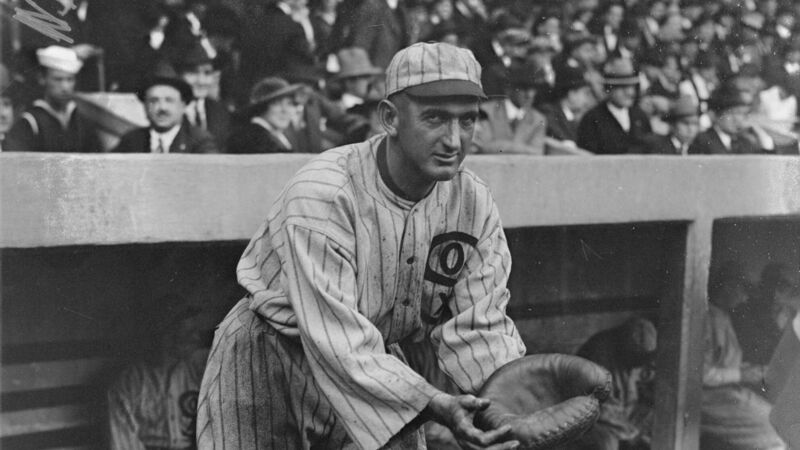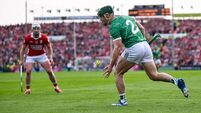Jack Anderson: When gambling sees an opportunity, trouble isn't far behind

Shoeless Joe Jackson, posing as catcher, Chicago AL (baseball), 1917. glass.Picture: Sepia Times/Universal Images Group via Getty Images
GOODFELLAS is one of the great gangster movies. The central character, played by Ray Liotta, is Henry Hill. Hill was in fact a real-life mobster associated with the Lucchese crime syndicate, one of the five Mafia families of New York. He really did turn on his associates and was placed in witness protection in the 1980s.
In Goodfellas, gambling was one of the ways in which the gang made their money, usually a “running the numbers” illegal lottery. The gang also dabbled in sports betting.
In real life, once Hill turned state’s evidence, he told prosecutors about the involvement of an associate, Jimmy “the Gent” Burke, in a match-fixing scam involving college basketball. Burke was the basis for the character, Jimmy Conway, played by Robert de Niro in Goodfellas.
The scam involved the Boston College Eagles. College players at the time (1978/79) were unpaid and some had minor gambling or illicit drug debts to pay off to the Mob. They were easy targets for Hill and Burke. The idea was that the players would, at the behest of the mobsters, ensure that the final score in a game was either within or outside the spread or score handicap on that game.
This, like insider trading on the stock exchange, allowed the mobsters to profit on the betting markets. The players benefited by way of bribes paid up front, the “settlement” of their debts or just generally avoiding a “swim with the fishes”.
The whole affair is brilliantly captured in a 30 for 30 ESPN documentary called Playing for the Mob (2014).
Why this history? This week the FBI published indictments that were the culmination of an investigation into two Mafia-linked conspiracies involving illegal poker games and the manipulation of NBA games.
The first investigation is straight out of a James Bond movie. The allegations are that mafia associates hosted high stakes poker games but used shuffling machines, dye only identifiable by special contact lenses and strategically placed phone cameras, to read cards. Players, honey-trapped by promises that they would mix with NBA personalities, were, bluntly, fleeced. They say the poker is a game of both skill and chance. In this game, no matter how skilful you were, you hadn’t a chance. One player lost US$1.8million in one sitting.
The story is that the origin of the word sandwich originates from an 18th-century English nobleman, Lord Sandwich, who was so transfixed by card gambling that he demanded a meal, of two slices of bread either side of a piece of meat, that he could hold in one hand so as to keep playing. The players in the mob’s rigged poker games had theirs toasted.
The second part of the FBI indictment concerned what’s called inside information and involved at least one current NBA player. In the NBA, you are permitted to bet on a wide range of so-called propositions (props) on individual player stats e.g., how many passes, points or rebounds etc etc a player will have in a game. Typically, the odds will be set on the player’s overall statistical average. Central to this scam is the allegation that the player told others in advance that he would, early in a game, substitute himself off due to “injury”. Gamblers then knew that the player would not come near his usual statistical average and thus that game’s prop bet markets could be manipulated.
Similarly, gamblers got prior notice that a certain player from the Lakers (LeBron, who is not under investigation and had no knowledge of the scam) would not play in a particular game. Again, that privileged, inside information apparently allowed gangsters to short the betting markets, which, if proven to the criminal standard, would be a fraud.
Inside information is gold to gamblers. The NBA has recently announced changes to its injury update regulations to ensure that teams are transparent in advance about selections – no dummy teams. NBA players will have to be more careful with whom they associate. Ironically, players will have to adopt the old mafia approach of omerta – a code of silence about the inner sanctum of the team and its preparations.
One of the biggest scandals of recent times in US sports came when its biggest baseball star, Shohei Ohtani of the LA Dodgers, was implicated in a multi-million dollar, illegal betting conspiracy involving his Japanese interpreter. Ohtani, currently starring in this year’s World Series, was an entirely innocent party but the interpreter, who used his privileged access to inform his betting, pleaded guilty to multiple federal criminal offences.
Similarly in soccer, there have been a number of high-profile incidents alleging that players are deliberately getting yellow cards in games having told others in advance. West Ham's Lucas Paquetá was accused of doing so in four separate Premier Leagues games but recently the FA case against him was dismissed because the betting analysis did not hold up.
The simplest way to prevent this happening would, of course, be to ban prop betting or yellow card markets. That is not going to happen. Although not a major market, prop betting is a nice bit of business for the bookies and sports bodies like them because it is a way of keeping punters’ eyeballs on the whole game. The longer punters stay watching, the more advertising can be sold to them. The more advertising that can be sold, the more valuable will be the media rights that underwrite modern sport.
That being said the NBA will have abhorred the bad publicity it got last week as it starts its season. The fact that the current FBI director Kash Patel has the high moral ground over you is not a good place for anyone to be in contemporary America. Expect the NBA to work more closely with wagering operators in whose mutual interest it is to “fix the fix” on their “products”.
Ironically in the US Supreme Court case from 2018 which liberalised the US’s gambling regime, one of the judges foreshadowed this problem, warning that deregulation would “hook the young on gambling, encourage people of modest means to squander their savings and earnings, and corrupt professional and college sports.”
There is no going back to pre-2018 era in the States, where gambling was effectively prohibited apart from limited pockets such as Las Vegas or on tribal lands. Legally, a beaten docket can only be torn up not amended. For now, all the US can do is learn from other countries that have dealt with such sports integrity issues and remember its own history with sports gambling scams.
Apart from Henry Hill, Ray Liotta also played Shoeless Joe Jackson in the movie Field of Dreams. Jackson was infamously at the centre of the fix by gambling gangsters of the 1919 World Series in baseball. In the greatest American novel of them all, The Great Gatsby (which at its core is about how the American dream is often little more than that of the quick, illicit buck) Gatsby recalls meeting the gangster behind the 1919 fix. An associate asks Gatsby to explain the gangster’s motivation.
Gatsby paused and then said simply, “He just saw the opportunity.”



